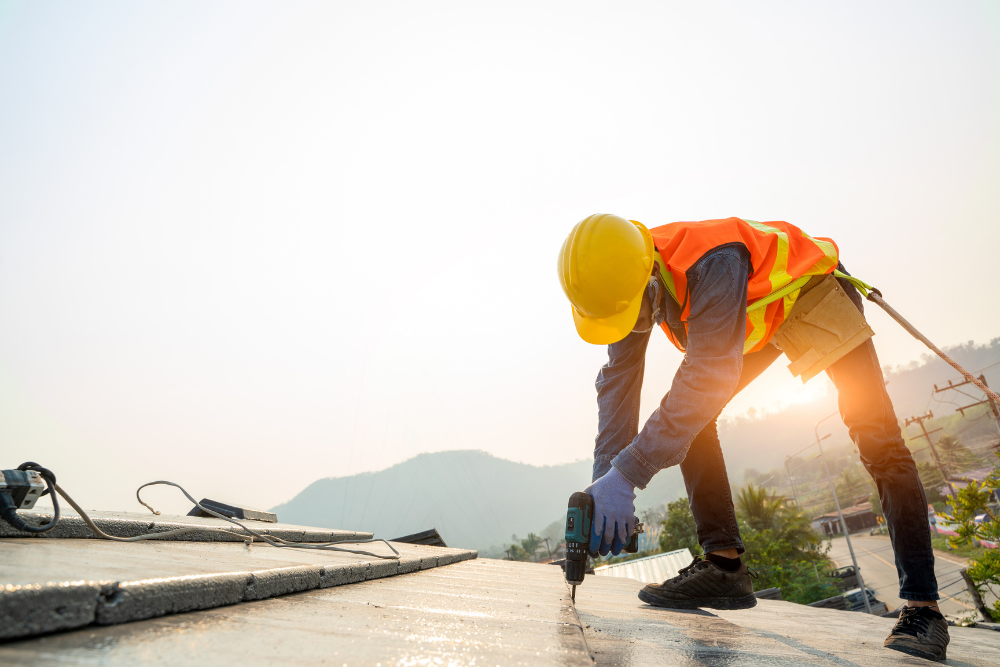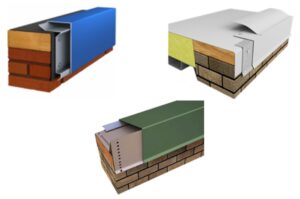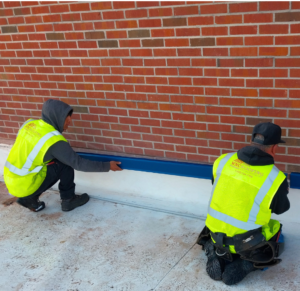The Best Commercial Roofing Materials
Table of Contents
The best commercial roofing material comes in many types and styles, and each material has its own advantages and disadvantages. If you’re a commercial building owner or a facility manager, it’s smart to know what distinguishes each type of roofing material and the unique situation of your commercial building structure, so you can choose the best material for your building.
This overview gives you a good foundation for when you start meeting commercial roofing contractors on your property, you’ll be prepared to understand the various proposed materials. Your commercial roofing contractor will also be able to evaluate your building’s roof and make a recommendation based on your budget, building type, and environmental conditions.
Many commercial buildings have flat or low sloped roofs, and the material used on those roofs must accommodate that particular roof shape. They should be installed to specific manufacturer’s requirements to withstand a variety of environmental conditions and meet the standards set for the manufacturer’s material warranty. Let’s take a look at some of the best kinds of commercial roofing material and the best use cases for them.
Thermoplastic Polyolefin (TPO)
Thermoplastic polyolefin (TPO) is a relatively newer roofing membrane that has gained popularity due to its lower cost and ease of installation compared to other single-ply membranes. It has a white surface that reflects light back into the atmosphere and is most commonly used in warmer climates where facility cooling days outnumber warming days. This helps keep the building cool in times of hot weather, which can reduce the burden on the building’s HVAC system. Although TPO is quickly becoming one of the more popular commercial roofing materials available in the United States it’s important to understand that it may not be the best solution for your specific situation.
Benefits of TPO
In addition to its relatively low cost, TPO roofing is both durable and flexible. This roofing material allows for shifting or settling in the building while resisting any damage or tears. Other benefits of TPO include:
- Low maintenance
- Easy to install
- Does not contain toxic ingredients
Cons of TPO
Standing water on roofs with minimal slope will create dark silt areas once the water evaporates. These areas can heat a TPO membrane to over 140 degrees causing the membrane to decompose over time. TPO should be used with roofs that have a slight slope or installed overtop of a tapered insulation system to direct water to drains and gutter systems.
Depending on the number of warming days vs cooling days and the use of your building, a white TPO membrane will not be as energy-efficient as a black EPDM membrane.
Ethylene Propylene Diene Terpolymer Rubber Roofing (EPDM)
As a rubber roofing material, EPDM roofing is known for its resistance to temperature extremes, wind, and extreme weather conditions like hail and heavy rain. EPDM is a pliable material and will withstand a variety of extreme temperatures while offering superior ozone protection. This is a preferred roofing material in parts of the country where the weather fluctuates and severe weather is common.
Benefits of EPDM
EPDM has a variety of attractive features that draw commercial property owners. This single-ply roofing membrane is both light-weight and durable, which is especially beneficial when building weight is a factor. Other benefits include:
- Fire-resistance
- Resistance to standing water, UV radiation, various chemicals
- Retains heat to provide insulating properties for facilities where heating days outnumber cooling days.
EPDM is also known to be very durable and can last a long time when properly installed.
PVC Roofing
Having withstood the test of time, PVC roofing material is a tried and true, strong but stable thermoplastic membrane in the form of a durable sheet, with resistance to chemicals and pollutants. It provides good protection against water leaks, fire, UV rays, chemical and grease exposure. PVC is stronger than TPO however is also more expensive. Your commercial roofing contractor can help you find a PVC that will withstand the elements and the daily exposure that your roof undergoes. Great for restaurants and factories with grease or chemical vapor vents.
Benefits of PVC Roofing
PVC roofing is known for its exceptional lifespan – this roofing membrane will usually last at least two decades. Durability is just one of its many benefits. PVC roofing is also:
- Easy to repair
- Stronger than TPO
- Eco-friendly
Metal Roofing
Metal roofing is used on residential and commercial buildings alike. It’s desirable for its ability to withstand high winds, fire, rain, and UV rays. Metal roofing differs from the other roofing types described above because it’s used on sloped roofs and should not be installed on a roof that is flat.
Benefits of Metal Roofing
There are many benefits of metal roofing like:
- Durability and longevity
- Resistance to a variety of challenging conditions.
- Customizable in shape and color
Cons of Metal Roofing
- Metal is one of the more expensive roofing options available.
What Factors Should You Consider When Installing a Commercial Roof?
There are many factors to consider when deciding what sort of roofing material to install on your commercial roof. Your contractor can help you sort through these many variables until you choose the right roofing material for your roof. Here are some things to keep in mind:
- Slope. Water drainage is a key factor that determines the best material to use on your roof. The structure of your roof and the environment will dictate the best solution.
- There are a number of ways to attach each membrane, fully adhered, mechanically attached, and ballasted. Each offers variations in costs and benefits. A licensed commercial roofing contractor will be able to provide insight as to the best option for your budget and conditions.
- Budget. Talk to your contractor upfront about your budget, as this may dramatically impact your roofing material choices.
- Warranty. You should expect a material warranty no matter what direction you choose. Leading roofing material manufacturers offer a 20-year warranty for factory defects. However, most of the issues come as a result of improper installation. A manufacturer representative should inspect your completed roofing project to ensure that the product has been installed to meet their warranty requirements. Labor warranties should also be provided by either your contractor or the best warranty option is that which covers labor and material and is provided by the manufacturer. Your roofing contractor should be able to explain the differences and costs of each.
Looking for the Best Commercial Roofing Material? Contact WNC Roofing
Are you ready to install the best commercial roofing material on your existing commercial building? Contact WNC Roofing to discuss the available options and find the right roofing material for your commercial building.



